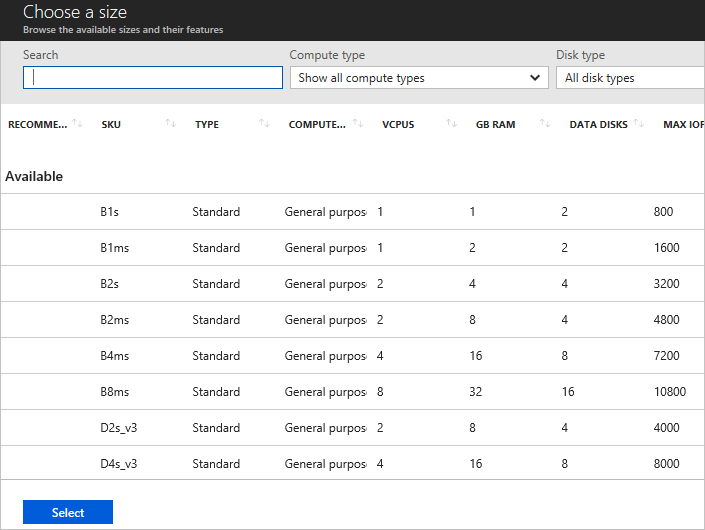Microsoft.Compute.SizeSelector UI element
A control for selecting a size for one or more virtual machine instances.
UI sample
The user sees a selector with default values from the element definition.

After the control is selected, the user sees an expanded view of the available sizes.

Schema
{
"name": "element1",
"type": "Microsoft.Compute.SizeSelector",
"label": "Size",
"toolTip": "",
"recommendedSizes": [
"Standard_D1",
"Standard_D2",
"Standard_D3"
],
"constraints": {
"allowedSizes": [],
"excludedSizes": [],
"numAvailabilityZonesRequired": 3,
"zone": "3"
},
"options": {
"hideDiskTypeFilter": false
},
"osPlatform": "Windows",
"imageReference": {
"publisher": "MicrosoftWindowsServer",
"offer": "WindowsServer",
"sku": "2012-R2-Datacenter"
},
"count": 2,
"visible": true
}
Sample output
"Standard_D1"
Remarks
recommendedSizesshould have at least one size. The first recommended size is used as the default. The list of available sizes isn't sorted by the recommended state. The user can select that column to sort by recommended state.- If a recommended size isn't available in the selected location, the size is automatically skipped. Instead, the next recommended size is used.
constraints.allowedSizesandconstraints.excludedSizesare both optional, but can't be used simultaneously. The list of available sizes can be determined by calling List available virtual machine sizes for a subscription. Any size not specified in theconstraints.allowedSizesis hidden, and any size not specified inconstraints.excludedSizesis shown.osPlatformmust be specified, and can be either Windows or Linux. TheosPlatformis used to determine the hardware costs of the virtual machines.imageReferenceis omitted for first-party images, but provided for third-party images. TheimageReferenceis used to determine the software costs of the virtual machines.countis used to set the appropriate multiplier for the element. It supports a static value, like 2, or a dynamic value from another element, like[steps('step1').vmCount]. The default value is 1.- The
numAvailabilityZonesRequiredcan be 1, 2, or 3. - By default,
hideDiskTypeFilterisfalse. The disk type filter enables the user to see all disk types or only SSD.
Next steps
- For an introduction to creating UI definitions, see Getting started with CreateUiDefinition.
- For a description of common properties in UI elements, see CreateUiDefinition elements.